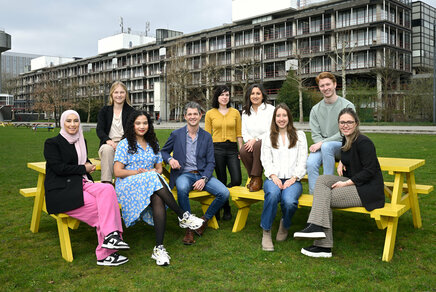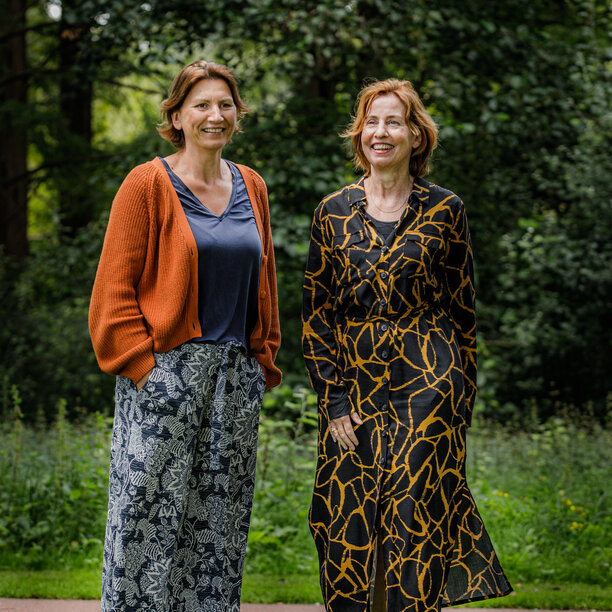"We’d like to see every group have a double safety net"
Shared leadership offers a balance between leading and the business of science.
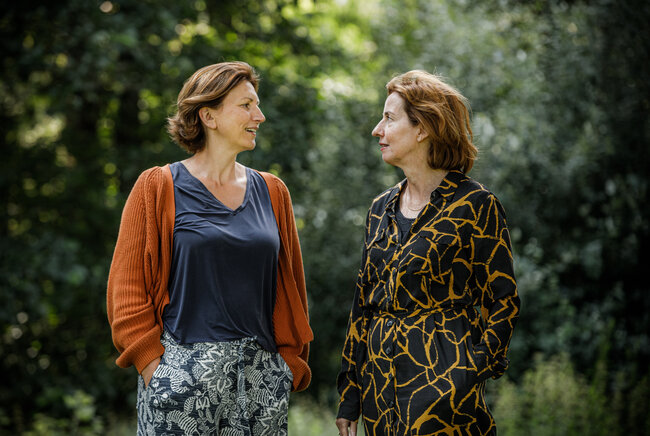
For two years now, Pascale Le Blanc and Josette Gevers have co-chaired the IE&IS Department’s Human Performance Management capacity group. They are among the first at the university to jointly fill this position. And yes, that puts pressure on their academic work. But sharing leadership means they can relieve each other, so there is always someone available to guide the group.
Scientists rarely covet filling a leadership position as part of their careers. It is often another task on top of their already considerable workload as researchers. And it can feel like an interruption to their scientific work. That is because leading a group well takes up so much time. It often denies them enough time to do research or write proposals, articles, and papers. That is not always appealing if you have ambitions of becoming a full professor.
That was one of the reasons the Industrial Engineering and Innovation Sciences Board decided to appoint not one but two people to chair the Human Performance Management’s (HPM) capacity group. "They didn't want this leadership position to torpedo our academic careers, so they reasoned we could handle the task better together,” says Josette Gevers, an associate professor within the HPM group. She co-chairs this capacity group with Pascale Le Blanc, a full professor of Workplace Innovation and Sustainable Employability.
It’s important to us that there’s always someone available for our people
Co-chair HPM-group Josette Gevers
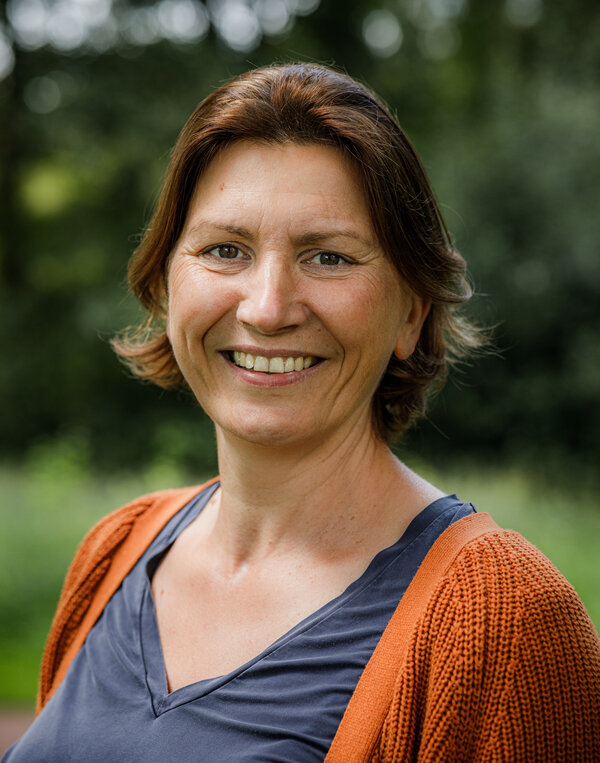
Gevers readily admits that this leadership position puts a strain on their scientific work. “Our full schedules speak for themselves. But if I have to write a proposal or finish an article, I can confidently leave the group to Pascale. It’s important to us that there always be someone available for our people. And that, for example, they receive an answer to their email within a day. Even if that answer is ‘I’ve seen it and will get back to you’.”
Complementary
During the interview, Le Blanc and Gevers, unwittingly, reveal their strengths. They continuously complement each other, finish each other’s sentences and reinforce each other's message. They openly and honestly evaluate their first two years as leaders of the Human Performance Management group.
Their complementary personalities are a great advantage for their joint leadership. “Pascale truly works from her heart. She sees people better than I do,” says Gevers. “She sees how they’re doing, what they need, what their qualities are. And how we can better bring those qualities to the fore. I'm more analytical. I consider the situation more than the person. I really envy that Pascale always knows exactly what to say.”
Le Blanc, in turn, praises her co-chair’s analytical side. “I’m very solution-oriented and sometimes get caught up in our colleagues’ emotions. Then Josette will say, 'Let's sort this out. Let’s look at it calmly and only then make a decision. She’ll take a step back in order to move forward.”
“It’s also wonderful to be able to leave your group in such capable hands when you have to finish an article or proposal. Or for a personal reason. When my father passed away, I could give that my full attention, without worrying, because Josette took over.” Le Blanc did the same for her colleague when Gevers needed surgery and time to recover after a snowboarding accident. The group simply kept going, thanks to their twin roles. “We wish all capacity groups had such a double safety net,” says Gevers.
I trust her completely. She doesn’t have any hidden agendas
Co-chair HPM-group, Pascale Le Blanc
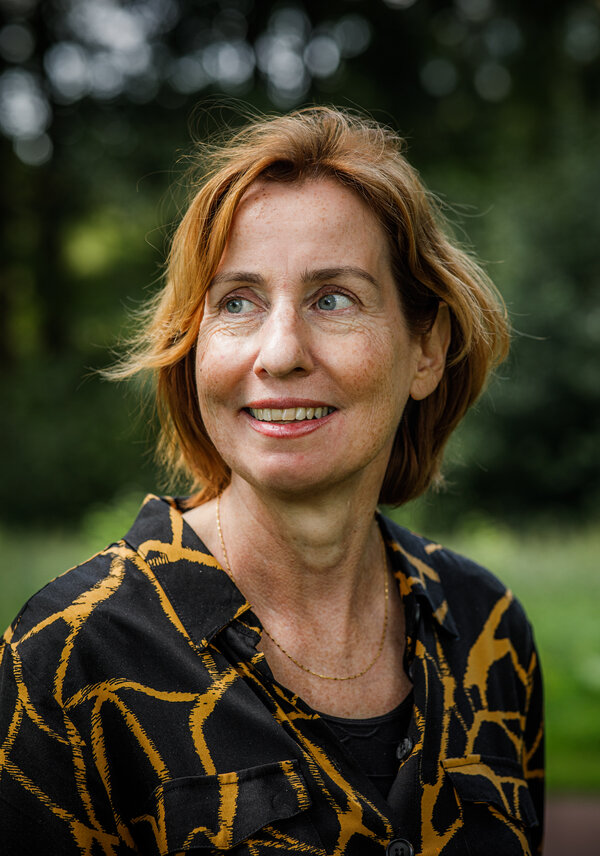
Both women consider openness, trust, and transparency vital for their dual function’s success. “I trust Josette completely. There are no hidden agendas, and neither of us wants to outdo the other. I can confidently leave things with her.” Gevers confirms, “I feel the same. We’re very equal.”
They do everything together. Though, Gevers is more involved with organizing the education side of things, having previously been the group’s education coordinator. “We sometimes divide topics if we think one of us is better at it. That way, we make the best use of each of our abilities,” says Le Blanc.
Gevers: “We opted not to divide the week up; we’re both there every day. I think that also makes it easier. You're never alone in everything and, because you decide together, don't have to doubt whether you've made the right decision. Although, of course, we also consult with others in the group.”
Leadership style
The basic idea of leadership Le Blanc and Gevers practice is that the group directs and leads itself. They paid close attention to what Professor of Organization Studies and management guru Mathieu Weggeman says. Gevers: "He says, 'Want to lead higher educated people? Don't!’.” Le Blanc: “Our group doesn’t wait for someone to tell them exactly what to do. We primarily play an on-demand coaching role. We brainstorm to solve problems with which our group struggles. But we also consider how we can support them in the steps they’d like to take, the things that excite them.”
Nevertheless, if need be, they will hold a mirror up to their group’s members. “Scientists need that sometimes because they’re very focused on their own subject matter,” says Gevers.
Teamsport
“Science is a pretty solitary sport; everyone’s building their careers,” she continues. “Our job is to bring the team together. We have to convince people that they can achieve more if they work together. That enriches everyone.”
At the same time, these co-chairs realize that the scientific community does not yet adequately consider team effort and multidisciplinary collaboration. “That’s harder to measure and less apparent on your CV. And yet, these are crucial qualities for good scientists. I’m pleased that the new Recognition and Rewards system focuses more on this,” says Gevers.
Work/life balance
“No other discipline demands as much passion for and dedication to its work as science. If everyone here stuck neatly to office hours, things wouldn't run so well,” says Le Blanc. But the two of them try to foster the idea of working on relaxation too, paying attention to yourself and your home life.
“First thing every morning, I walk the dog and only then start work,” says Gevers. Le Blanc is an early bird, so she always gets a lot done in the morning. "I also make time to exercise, usually in the evening,” she says. “After that, my laptop often beckons with matters that require attention. I try to limit that to about 8 pm or so; then the laptop goes off.”
Sometimes, a day feels unproductive because I didn’t deliver an article. While, on the leadership front, it was actually very beneficial
Co-chair HPM-group, Josette Gevers
Gevers admits she sometimes feels the urge to keep working in the evenings. “Sometimes I’ll label a day as unproductive because I haven’t delivered an article, written a research proposal, or given a course. As a scientist, that feels unsatisfying. But on the leadership front, those days are often very beneficial. Still, I then often feel I have to make up for it in the evening.”
In that respect, these two leaders keep a close eye on each other. Le Blanc: “Once, I messaged Josette about something work-related on a weekend. To which she replied, ‘Pascale, tomorrow is another day.’ Which, of course, was the absolute correct response.”
Vision for the future
After making it through two years of COVID-19, Gevers and Le Blanc think it is time to start focusing on the group’s future again. “We want to be known as the group you can approach with questions about how to set up your organization when it comes to employees and technology. How do you incorporate technology into existing work processes so that people embrace it and see it as a tool, not a threat? So that employees as well as the business benefit from it,” they both say.
Their research includes using the latest forms of technology to better understand how (technological) labor processes affect people. Think of wearables that measure how teams deal with stressful situations. In doing so, they want to answer the question: how do you ensure that people remain effective and enthusiastic about their job, thus optimally contributing to positive business results?
They want to increase the HPM group’s visibility. Within the university, and more broadly. They want to collaborate more with consortia to draw attention to their research results and demonstrate its added value. Le Blanc: “We need to show our faces. Not only conferences and via publications in scientific journals. But to companies and organizations in the Brainport region, too. Hopefully, we can pick this up again soon, now that the corona measures have been relaxed.”
What is the group’s opinion?
Ad Kleingeld, an assistant professor within the HPM group, thinks, as co-chairs, Gevers and Le Blanc exude calm. “A capacity group chair is still first and foremost a scientist. Sharing this major administrative task allows them to continue their own teaching and research. That offers peace of mind, which they radiate. I’ve been working at the TU/e for 30 years. And, in my experience, chairpersons hardly have time for anything, with all the stressful consequences this entailed,” he says.
Doctoral candidate Luuk van Iperen finds it useful that the group can always reach one of the two women. “It’s difficult to give an opinion on the shared leadership because corona has made true group contact impossible. But it generally goes well. A big advantage is that, together, they reach a more nuanced, considered view.”
Philippe van de Calseyde, an assistant professor at the HPM group, thinks sharing the workload is a plus. “Things generally go very well, and they’re pleasant to work with. One disadvantage is that I don't always know who to go to with a particular question. Then I often just email them both.” Van Iperen also mentions that: “I think coordinating the division of labor between the two of them takes extra work.”
“My experience with two group managers is certainly positive, “ says doctoral candidate Renée Boesten. “Josette and Pascale made it clear at the start who’s responsible for which tasks. Because of that clear communication, I think we, as a group, know where we stand and who to approach in which situation."
“Pascale and Josette’s qualities complement each other nicely. They’re both very approachable. They’re open to suggestions and ideas from the group and actively ask for them. Recently, when we all had to work from home, I truly appreciated that they made an effort to check on people. They did so by scheduling one-on-one conversations," adds associate professor Sonja Rispens.
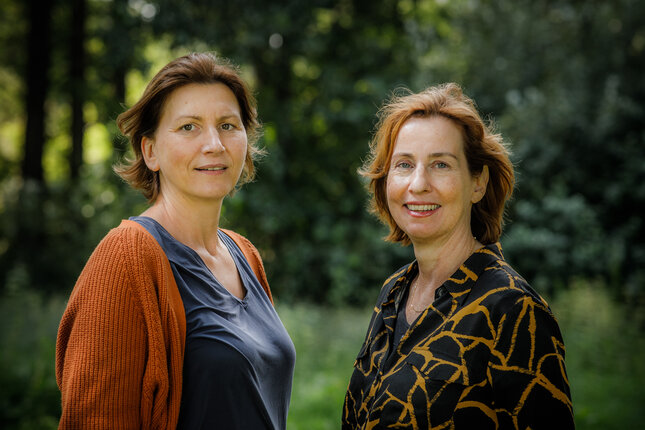
Leading during a global pandemic
Corona was a great test case for Le Blanc and Gevers as new capacity group chairs. “No-one was left unaffected by it, but it was especially wearisome for parents with small children. I found it very difficult to stay in touch with our group,” Gevers confesses. “Some people were in danger of losing touch,” adds Le Blanc. “Then I’d think, ‘I'm going to call him/her,’ but, at the same time, I found that difficult. I didn't want people to think I was checking on them to see if they were working.”
“When you work on campus, it’s easy to strike up conversations, and you can quickly gauge how people are doing. Phoning someone to talk about how they are, felt very awkward,” says Gevers.
They wanted to make the group feel connected, and their colleagues shared that need. They did online activities and sent gifts to people at home, trying to keep in touch. "I liked that our colleagues came up with the idea of a virtual living room."
Challenges
The big challenge for Le Blanc and Gevers is to lead their people responsibly through the high workload. “As a university, we ask a lot of our people, and it’s quite difficult to support them in all aspects. The work has to be done, so you can't simply let things slide. At the same time, you have to take the signs that someone is struggling seriously,” says Le Blanc. “Offering help is in small things, like pointing out smarter ways for people to manage their time. Or giving advice on how to approach something. We do that from our role as coaches.”
Two years down the line
The first two years were not representative, in the true sense, due to working from home. Gevers and Le Blanc still feel like they are in survival mode. Despite that, they feel good about their shared chairmanship. Gevers: “Other capacity group chairs were curious about how we were doing too. It may sound strange, but we wish this for other groups as well. If you’re a good team and have someone you can truly trust at your side, whom you can develop alongside, a dual role has many advantages.”
More on our strategy

![[Translate to English:] [Translate to English:]](https://assets.w3.tue.nl/w/fileadmin/_processed_/c/f/csm_BvOF_2024_0319_AEV_license_TUe_Dirk_van_Meer_-_CORE_1__c976e259a5.jpg)
